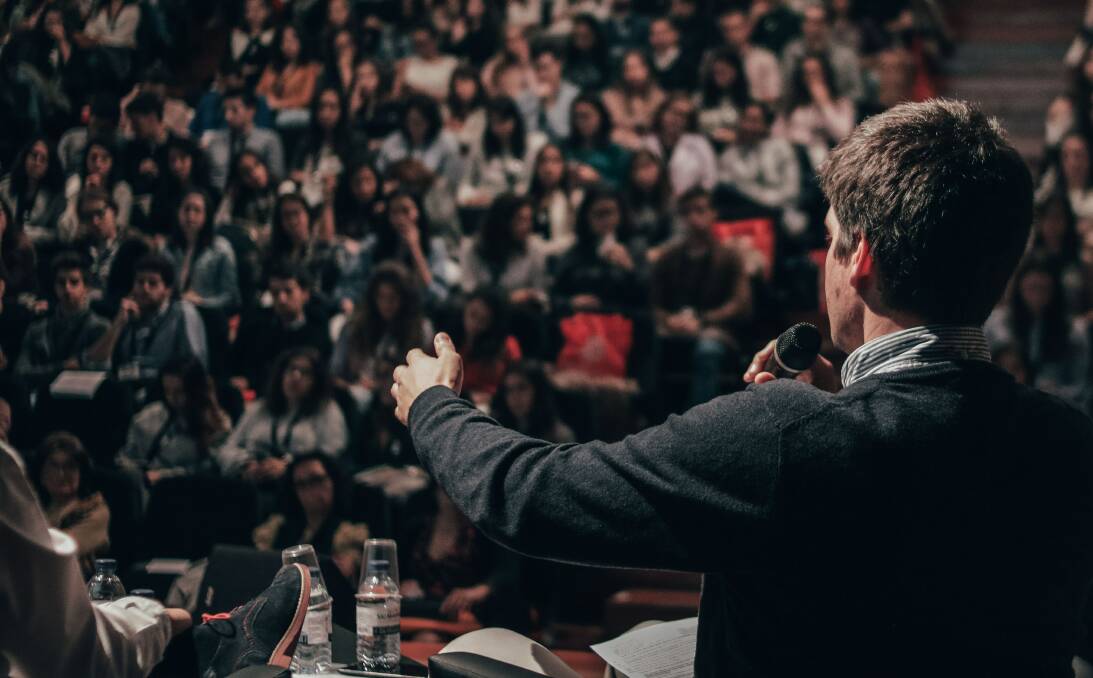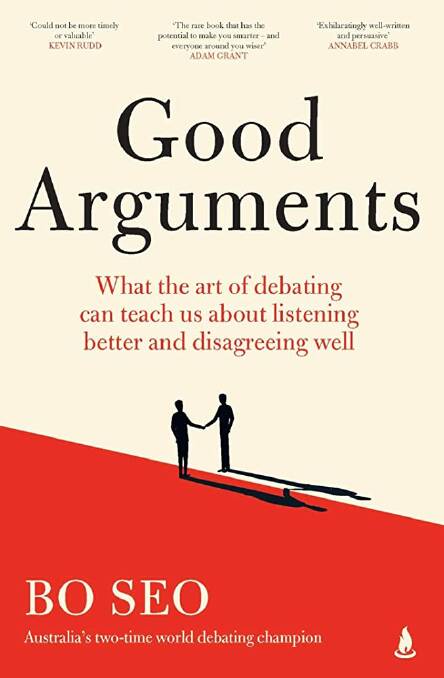
In competitive debating, the winners take all. There is no room for compromise and collaboration. The job is to prove the opponents are talking absolute balderdash while your arguments are robust and watertight, with not a millimetre to move.
Subscribe now for unlimited access.
$0/
(min cost $0)
or signup to continue reading
This game usually takes place in a pressure-cooker environment. The setting is a school after hours and the tools are legal pads, pens and the ability to conjure information from the depths of memory. It's the Olympics for brainiacs, the sports carnival for bright young talkers.
There's no denying the thrill of talking your way to victory.
But I always found it to be a little suspect, perturbed perhaps by the ease with which bright teenagers could argue for or against the merits of nuclear energy for Australia. Could we not put our talents to use on something more productive? With just a little notice, teams could mount cases for anything with little apparent regard for the actual outcomes of what they were saying. This is perhaps unfair. They no doubt had some concern for the outcomes, but were well trained to put this aside for a night when victory and their school's honour mattered. It seemed to me like a dubious moral grounding.
In the hands of debaters, ideas are made malleable and everything becomes relative. It seemed to me the best debaters were the ones for whom the outcome least mattered, that way they could jump in on any side. No skin in the game.

I wrote a piece, while I was still in high school, for The Sydney Morning Herald which essentially declared debating had ruined Australian politics. Politicians were trained in this manner of arguing that seemed distant from the reality of the outcomes. The rot set in, I argued, among the blazer-clad private school-dominated debating competitions.
The piece got people talking, although, amusingly, the teacher who had run the school debating team of which I had briefly been a member never spoke to me again. The merits of debating were not a debate she wanted to have.
So when a two-time Australian world debating champion writes a book about the merits of debating, charting his own rise through the ranks of school debating to conquer the globe, all the while sharing the secrets of competitive debating in a quest to turn out better listeners and thinkers, I was prepared to take a dim view.
Bo Seo moved to Australia with his parents from South Korea in 2003, just before he went into Year 3. The experience, he writes, left him feeling alienated. Contending with English in a strange new country, he went for the path of least resistance: he was utterly agreeable.
School debating changed all this. Partly.
Seo rose from primary school to high-school debating, then on to state-level debating and beyond. There was freedom in arguing for positions Seo did not have to arrive at himself. Debate night was an "institution" where the carefully primed structure, agreed by all participants and adjudicators, "made our disagreements understandable and, in doing so, revealed the world to us".
But Seo says he was living a life of contradiction. He remained agreeable in everyday life. The cut and thrust of argument was kept contained. Can agreeable people make good debaters? Perhaps the trick of Seo's book is they make the best debaters. Agreeable people like compromise and know conflict is often a lot of sound and noise about certain disputed elements. Give them the tools of debating and they can develop good outcomes that break through the disputes and return combatants to the shared big picture.
Seo, formerly a reporter on the Financial Review, sets out five pillars of debating: topic, argument, rebuttal, rhetoric and quiet. The first four are clearest, because debating needs something to be debated, arguments either way and arguments in response to other arguments. But the idea of quiet seems out of place. Yet the quiet bit is the part that allows debaters to hear their opponents, reflect on what they are doing and whether it is harmful. An artificial intelligence could now manage the first four; humans need the fifth.
"We reminded ourselves that the burden of arguing a case was borne by people," Seo writes of planning a debating competition at Harvard.
The adverserial debate form does not suit some sensitive topics, Seo believes. It needs to be used carefully. He's right, as too often a disingenuous, harmful spray begins with some free speech absolutist declaring, "We need to have a debate." But Seo notes two rather neat and succinct truths: "Arguments are easy to start and hard to end" and "Disagreements expand rather than subtract". The beauty of structured debating forms, Seo argues, is they do allow a wider range of topics to be carefully argued, because the rules prevent a name-calling shouting match.
When Seo was in primary school, he came to Canberra on a school excursion. His Year 5 class heard from a Hansard editor at Parliament House, whose job was to make the debates of the chambers legible in print. She observed after a career of listening to politicians: "Most arguments are better than you think" and "No argument is flawless". The wise debater, then, knows while they look for flaws in their opponents' arguments, and they might be able to return serve with an improved argument, they will never craft a perfect one. And so on it goes, without an ultimate winner, just who came closest on the day.
The case then for the utility and benefit of debating skills is assured. From navigating living with your parents to solving geopolitical dilemmas, the classroom exercise on whether or not nuclear power is a good idea does have a place.
But Seo convinces me most about debating's ultimate usefulness when he is unsure, doubtful. Burnt out. See, despite his mastery of the debate form at the highest levels, Seo never shakes a touch of uncertainty about the form itself.
Take the so-called art of "spreading". In US debating competitions where an argument left unanswered is a point ceded, the trick is to talk as quickly as possible and make as many arguments as possible. A quirk of the formal rules has twisted debating beyond all recognition. The game becomes even more morally dubious and intellectually bereft. A master "spreader" is going to be no use at peace talks or a climate conference.
Then there is the question of who gets to debate. Seo names far more private schools and prestigious universities in his book than state schools and TAFEs as the homes of competitions.
Seo's account of the debating world illuminates why those kids graduate to run the world, apart from the obvious answer that family wealth establishes them for life. They are graduates who know how to talk the language, how to argue confidently when they really haven't a clue and get away with it.
Playing with ideas is a privilege afforded to a few. If all debaters turned out as circumspect, introspective and conscientious as Bo Seo there wouldn't be a problem. The game of ideas would be played by those who know its limits and proceed carefully within them.
The trouble is, Seo seems like an exception.
We've made it a whole lot easier for you to have your say. Our new comment platform requires only one log-in to access articles and to join the discussion on The Canberra Times website. Find out how to register so you can enjoy civil, friendly and engaging discussions. See our moderation policy here.


